
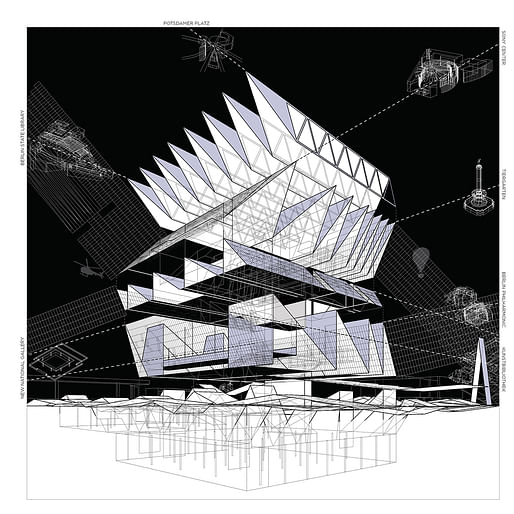
Students across North America get to flex their skills in structural steel design in the ACSA/AISC Steel Student Design Competition. Organized by the Association of Collegiate Schools of Architecture (ACSA) and supported by the American Institute of Steel Construction (AISC), this year's competition distinguished five prize-winners and four honorable mentions in two categories.
In Category I, architecture students were challenged to design a museum and figure out how to creatively design a popular urban destination. Category II was an Open competition with limited restrictions that allowed students to freely investigate steel design. Check out the top-winning projects below.
CATEGORY I WINNERS:
1st Place: Museum of the 20th Century
Student: Justin Foo
Faculty Sponsor: Andrea Simitch
Cornell University
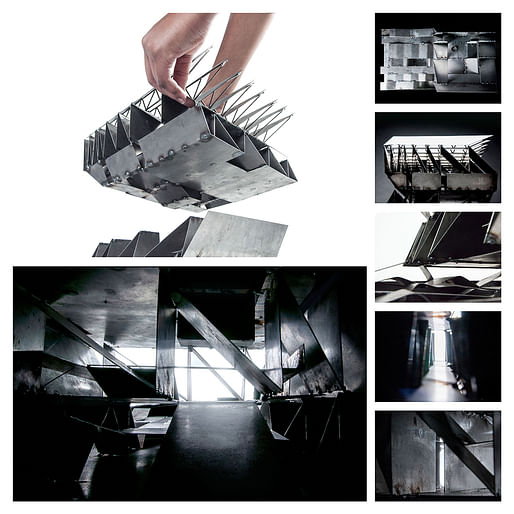
Project excerpt: “The proposal for the Museum of the 20th Century in Berlin borrows its initial spatial strategy from the adjacent Mies van der Rohe New National Gallery and a constructional affinity to Mies’ investigations into steel construction. A series of stacked and initially planar surfaces are subsequently deformed in response to program, site, orientation and structure. The fold acts as a mediator between the harsh Cartesian rationality of Mies and the lyrical tectonism of Scharoun. The fold is further used as a device, as an operative strategy, that allows for the mixing of programs, (not just blurring the line between the public and private, but between programs themselves as one surface defines the surface of the other), and that produces light control, structure, landscape, circulation, roofing, etc. The changing orientation of each plate 'collects' the architecture of city as part of the museum experience. Its crown-like roof allows soft northern light to illuminate the art within.”
2nd place: Museum of Architecture: Over and Under
Student: Nahid Akram
Faculty Sponsor: Kevin Hinders
University of Illinois, Urbana-Champaign
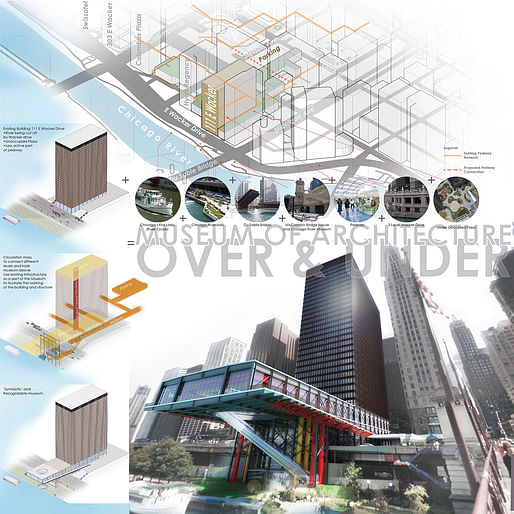
Project excerpt: “The Museum of Architecture: Over and Under, seeks to educate the public on ‘behind the curtain’ aspects of architecture. Chicago, a city with rich modern architectural history is a perfect location for such a project. The Illinois Center, a Miesian development near the edge of Chicago Loop, has a huge repository of intricate infrastructure such as: multi-level Wacker Drive, which separates the river-walk and accompanying Chicago Architectural River Cruise from the building; an incredible network of Pedways which can be entered from the surrounding buildings/blocks; and an under-occupied, raised plaza which provides a base for the thirty story Miesian steel buildings. A new structure will synergize with this existing context to form a new museum complex. Coupled with the existing Chicago Architecture Foundation River Cruise, this museum will teach museum visitors about the complex workings of structure, mechanical systems and transport. It will also show the impact of architecture on the built environment, and its meaning. The museum is thus a symbiotic building, supported and grown from the existing Miesian steel building and the Chicago cultural context.”
3rd place: Loop, Sculpture Museum in Indianapolis
Student: Wei Lin & Meghna Majethiya
Faculty Sponsors: Scott Murray & Marci S. Uihlein
University of Illinois, Urbana-Champaign
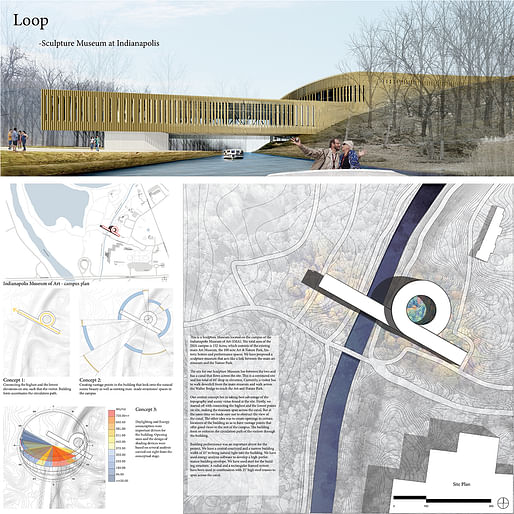
Project excerpt: “This is a Sculpture Museum located on the campus of the Indianapolis Museum of Art (IMA). The total area of the IMA campus is 152 Acres, which consists of the existing main Art Museum, the 100 acre Art & Nature Park, historic homes and performance spaces. We have proposed a sculpture museum that acts like a link between the main art museum and the Nature Park. [...] Our central concept lies in taking best advantage of the topography and scenic vistas found at the site. Firstly, we started off with connecting the highest and the lowest points on site, making the museum span across the canal. But at the same time we made sure not to obstruct the view of the canal. The other idea was to create openings in certain locations of the building so as to have vantage points that offer good views to the rest of the campus. The building form re-enforces the circulation path of the visitors through the building.”
CATEGORY II WINNERS
1st Place: The Public Factory: Rebuilding an industrial-icon of Detroit's past in order to galvanize its future
Student: Kevin Herhusky
Faculty Sponsor: Margarida Yin
California Polytechnic State University
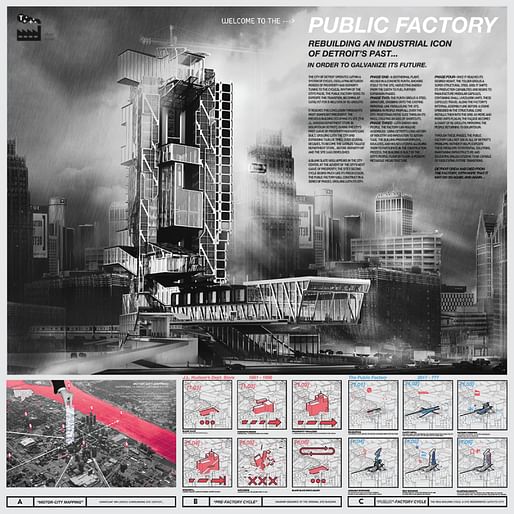
Project excerpt: “Detroit oscillates between periods of prosperity and disparity. Tuning to the cyclical rhythm of the city’s pulse, the Public Factory expedites this transition, catalyzing a new era of re-growth. It reaches this conclusion through its most significant precedent, the previous building occupying its site [the J.L.Hudson department store in downtown Detroit]. During the city’s first wave of prosperity Hudson’s was built, growing with the city and expanding twelve times, over several decades, to become the world’s tallest department store... before disparity hit and the site was demolished. A blank slate now appears in the city center, at the advent of the city’s next wave of prosperity, the site’s second cycle begins! Like its predecessor, the Public Factory constructs through phases, growing with its city.”
No 2nd place winning entry was selected this year.
3rd Place - Summit Climbing Retreat
Students: Daniel Wayne Campbell & Chase Emery Johnson
Faculty Sponsors: Kevin J. Singh & Pasquale De Paola
Louisiana Tech University
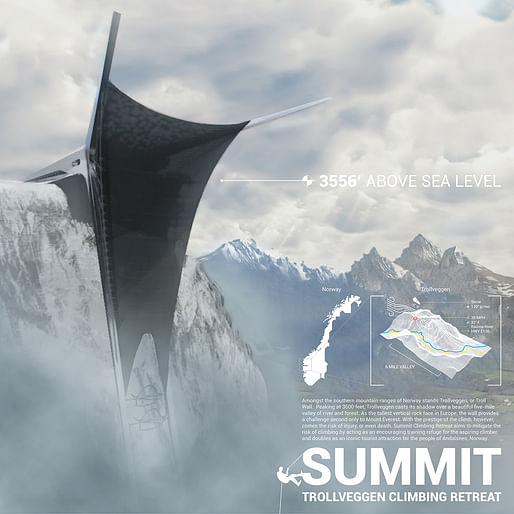
Project excerpt: “Amongst the southern mountain ranges of Norway stands Trollveggen, or Troll Wall. Peaking at 3556 feet, Trollveggen casts its shadow over a beautiful five-mile valley of river and forest. As the tallest vertical rock face in Europe, the wall delivers a climbing challenge second only to Mount Everest. With the prestige of the climb, however, comes the risk of injury, or even death. Summit Climbing Retreat aims to mitigate the risk of climbing by acting as an encouraging training refuge for the aspiring climber, and doubles as an iconic tourist attraction for the people of Andalsnes, Norway. [...] By activating the unique qualities of steel, the Summit Climbing Resort expresses the action of climbing in its structure, program, and utility. Sitting atop four massive friction dampers, the wide flange steel beams hang bold and strong in their center, like the body of the climber, while the hands and feet connect small and tense to the dangerous gneiss façade of the Trollveggen cliff. Twenty tension cables, buried sixty feet into the bedrock below, allow the entire building envelope to teeter delicately over the edge; only touching the cliff wall with redundant seismic dampers below, all with a natural tendency to resist the earthquakes that plague the entire region.”
Don't forget about the Honorable Mentions in the gallery below! You can find full details of each winning entry on ACSA's website.
All images courtesy of the 2017 ACSA/AISC Steel Student Design Competition.

Norman Foster Foundation / Kharkiv Freedom Square Revival
Register by Tue, Nov 5, 2024
Submit by Tue, Nov 26, 2024
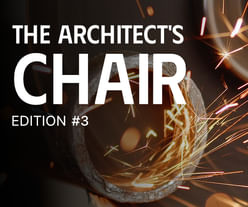
The Architect's Chair / Edition #3
Register by Wed, Nov 6, 2024
Submit by Tue, Feb 18, 2025
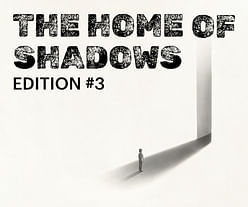
The Home of Shadows / Edition #3
Register by Thu, Nov 21, 2024
Submit by Mon, Mar 3, 2025
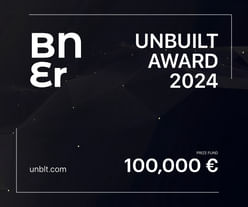
The Buildner UNBUILT Award 2024 / 100,000€ Prize
Register by Wed, Oct 30, 2024
Submit by Wed, Nov 20, 2024
1 Comment
Wow, that's an amazing maquette!